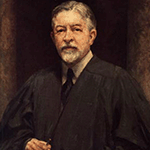
Edward Terry Sanford (1923-1930)
Lived from 1865 to 1930.
Early Life and Legal Career
Edward T. Sanford was born in Knoxville, Tennessee on July 23, 1865. Sanford received a B.A. and Ph.B. from the University of Tennessee in 1883, a B.A. from Harvard University in 1885, an M.A. from Harvard in 1889 and an LL.B from Harvard Law School in 1889. After law school, Sanford began his own private practice in Knoxville, in addition to lecturing at the University of Tennessee School of Law.
In 1907, Sanford served as Assistant Attorney General under President Theodore Roosevelt. As Assistant Attorney General, he was the lead prosecutor in United States v. Shipp, et al., a high-profile case involving a sheriff who was convicted of allowing a condemned black prisoner to be lynched. After serving just one year as Assistant Attorney General, President Roosevelt nominated Sanford to a seat on the United States District Court for the Middle District of Tennessee and the United States District Court for the Eastern District of Tennessee.
Appointment to the Supreme Court
Sanford was appointed to a seat on the Supreme Court of the United States on January 24, 1923 by President Warren Harding. During his time on the bench, Sanford authored 130 opinions, his most famous being the majority opinion in Gitlow v. New York. The opinion in Gitlow, which upheld a state law banning anarchist literature, implied that some provisions of the Bill of Rights apply with equal force to the states via the Due Process Clause of the Fourteenth Amendment. The case has since been cited in many precedent cases, such as Grisworld v. Connecticut.
Death
Sanford died on March 8, 1930 from uremic poisoning following a dental extraction in Washington, D.C.
Notable Cases
Gitlow v. New York (1925)
Okanogan Indians v. United States (1929)







